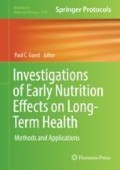Abstract
Under- or overfeeding during pregnancy can lead to behavioral deficits in the offspring in later life. Here, we present a protocol for setting up and carrying out the hyperlocomotion test for assessing behavioral symptoms such as psychosis or mania. As an example, we use the acute rat phencyclidine-injection model which exhibits hyperlocomotion and stereotypic behaviors, resembling the positive symptoms of schizophrenia.
Access this chapter
Tax calculation will be finalised at checkout
Purchases are for personal use only
References
Tarry-Adkins JL, Ozanne SE (2016) Nutrition in early life and age-associated diseases. Ageing Res Rev 39:96–105. https://doi.org/10.1016/j.arr.2016.08.003. Sep 1. pii: S1568-1637(16)30179-9. [Epub ahead of print]
Ong TP, Ozanne SE (2015) Developmental programming of type 2 diabetes: early nutrition and epigenetic mechanisms. Curr Opin Clin Nutr Metab Care 18:354–360
Jahan-Mihan A, Rodriguez J, Christie C, Sadeghi M, Zerbe T (2015) The role of maternal dietary proteins in development of metabolic syndrome in offspring. Forum Nutr 7:9185–9217
Arentson-Lantz EJ, Zou M, Teegarden D, Buhman KK, Donkin SS (2016) Maternal high fructose and low protein consumption during pregnancy and lactation share some but not all effects on early-life growth and metabolic programming of rat offspring. Nutr Res 36:937–946
Watkins AJ, Sinclair KD (2014) Paternal low protein diet affects adult offspring cardiovascular and metabolic function in mice. Am J Physiol Heart Circ Physiol 306:H1444–H1452. https://doi.org/10.1152/ajpheart.00981.2013
Raipuria M, Hardy GO, Bahari H, Morris MJ (2015) Maternal obesity regulates gene expression in the hearts of offspring. Nutr Metab Cardiovasc Dis 25:881–888
de Oliveira Andrade F, Fontelles CC, Rosim MP, de Oliveira TF, de Melo Loureiro AP, Mancini-Filho J et al (2014) Exposure to lard-based high-fat diet during fetal and lactation periods modifies breast cancer susceptibility in adulthood in rats. J Nutr Biochem 25:613–622
Govindarajah V, Leung YK, Ying J, Gear R, Bornschein RL, Medvedovic M et al (2016) In utero exposure of rats to high-fat diets perturbs gene expression profiles and cancer susceptibility of prepubertal mammary glands. J Nutr Biochem 29:73–82
Palmer AA, Printz DJ, Butler PD, Dulawa SC, Printz MP (2004) Prenatal protein deprivation in rats induces changes in prepulse inhibition and NMDA receptor binding. Brain Res 996:193–201
Wu T, Deng S, Li WG, Yu Y, Li F, Mao M (2013) Maternal obesity caused by overnutrition exposure leads to reversal learning deficits and striatal disturbance in rats. PLoS One 8(11):e78876. https://doi.org/10.1371/journal.pone.0078876
Bolton JL, Bilbo SD (2014) Developmental programming of brain and behavior by perinatal diet: focus on inflammatory mechanisms. Dialogues Clin Neurosci 16:307–320
Hoek HW, Brown AS, Susser E (1998) The Dutch famine and schizophrenia spectrum disorders. Soc Psychiatry Psychiatr Epidemiol 33:373–379
St Clair D, Xu M, Wang P, Yu Y, Fang Y, Zhang F et al (2005) Rates of adult schizophrenia following prenatal exposure to the Chinese famine of 1959–1961. JAMA 294:557–562
Guest FL, Martins-de Souza D, Rahmoune H, Bahn S, Guest PC (2013) The effects of stress on hypothalamic-pituitary-adrenal (HPA) axis function in subjects with schizophrenia. Rev Psiquiatr Clín 40:20–27
Guest PC (2017) Biomarkers and mental illness: it’s not all in the mind, 1st edn. Copernicus, Cham. 2017 edition (14 Jan. 2017). ISBN-10: 3319460870
Allen RM, Young SJ (1978) Phencyclidine-induced psychosis. Am J Psychiatry 135:1081–1084
Adell A, Jimenez-Sanchez L, Lopez-Gil X, Romon T (2012) Is the acute NMDA receptor hypofunction a valid model of schizophrenia? Schizophr Bull 38:9–14
Ernst A, Ma D, Garcia-Perez I, Tsang TM, Kluge W, Schwarz E et al (2012) Molecular validation of the acute phencyclidine rat model for schizophrenia: identification of translational changes in energy metabolism and neurotransmission. J Proteome Res 11:3704–3714
Egerton A, Reid L, McGregor S, Cochran SM, Morris BJ, Pratt JA (2008) Subchronic and chronic PCP treatment produces temporally distinct deficits in attentional set shifting and prepulse inhibition in rats. Psychopharmacology (Berl) 198:37–49
Sturgeon RD, Fessler RG, Meltzer HY (1979) Behavioral rating scales for assessing phencyclidine-induced locomotor activity, stereotyped behavior and ataxia in rats. Eur J Pharmacol 59:169–179
Author information
Authors and Affiliations
Corresponding author
Editor information
Editors and Affiliations
Rights and permissions
Copyright information
© 2018 Springer Science+Business Media, LLC
About this protocol
Cite this protocol
Ma, D., Guest, P.C. (2018). Hyperlocomotion Test for Assessing Behavioral Disorders. In: Guest, P. (eds) Investigations of Early Nutrition Effects on Long-Term Health. Methods in Molecular Biology, vol 1735. Humana Press, New York, NY. https://doi.org/10.1007/978-1-4939-7614-0_29
Download citation
DOI: https://doi.org/10.1007/978-1-4939-7614-0_29
Published:
Publisher Name: Humana Press, New York, NY
Print ISBN: 978-1-4939-7613-3
Online ISBN: 978-1-4939-7614-0
eBook Packages: Springer Protocols

